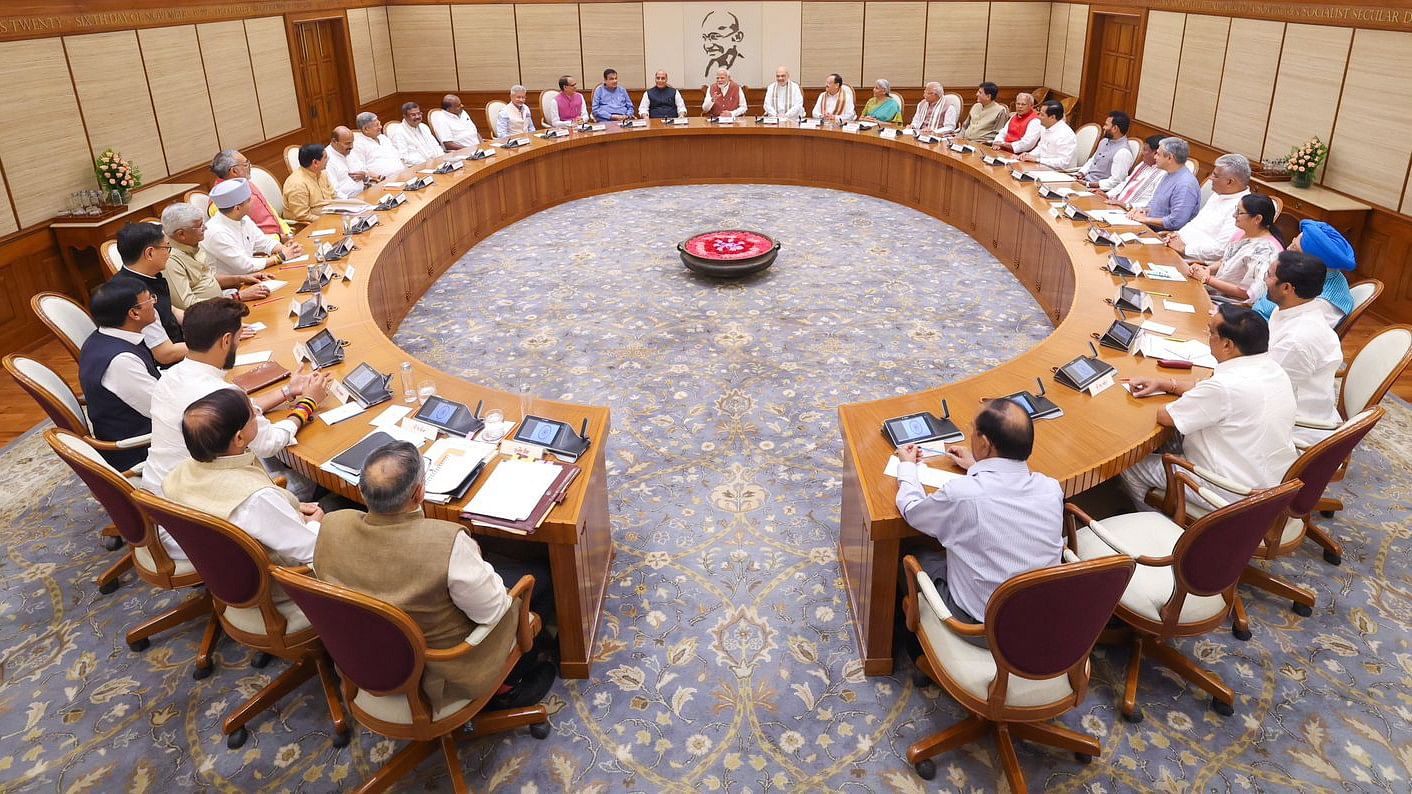
Prime Minister Narendra Modi chairing the first meeting of his new Cabinet.
Credit: PTI File Photo
By Mihir Sharma
Barely a fortnight after unexpected election results upended Indian politics, New Delhi looks to have settled into a familiar rut. Prime Minister Narendra Modi has apparently shrugged off his rebuke from voters and reasserted control of the federal government. While he may depend for continued power on a motley crew of allies, none have been given the sort of ministerial role that would suggest they will drive policy in coming years.
Yet, as my colleague Andy Mukherjee has argued, this continuity conceals a great deal of ferment. The biggest change should be to relations between New Delhi and India’s influential state governments.
However deferential Modi’s newly vital allies might appear, the fact is that they have plans, projects and constituencies of their own to cultivate. Coalitions in India aren’t like those in Europe, where common priorities are hammered out in advance and then shared publicly. Alliance politics involve continual give-and-take — and usually the smaller partners, many of whom command regional support bases, do quite a bit of the taking.
We know enough to predict what they will ask for. Modi’s two biggest alliance partners — Bihar’s Janata Dal (United) and Andhra Pradesh’s Telugu Desam Party, headed by state chief ministers Nitish Kumar and Chandrababu Naidu, respectively — have long demanded a greater infusion of federal funds into their states’ coffers. Now that they are pivotal to power in New Delhi, they undoubtedly see a moment to cash in.
Markets would seem to agree with that forecast: Companies linked to infrastructure projects in Andhra Pradesh have massively outperformed the indices over the past fortnight.
What’s odder is that Kumar and Naidu should have similar demands, despite the fact that they represent very different states. Bihar is India’s poorest, with economic and human development indicators worse than much of sub-Saharan Africa. Kumar is best known for innovative welfare schemes targeted at the bottom of the pyramid. His need for money is clear.
Naidu, on the other hand, is remembered for transforming the city of Hyderabad into a technology-and-innovation hub. Before Andhra Pradesh lost its northwestern districts (and Hyderabad) in a 2014 rewriting of state boundaries, it registered decades of growth, evolving from one of India’s most backward states into one of its most advanced. Now, though, the TDP wants to sink billions into a new capital to replace Hyderabad.
What the two states have in common is debt. Bihar and Andhra Pradesh have both spent more than New Delhi would like and are bumping up against the strict fiscal rules that federal policy makers have designed for state governments. This has limited the policy space available to both Kumar and Naidu.
Over the past decade under Modi, the central government has grown much stronger compared to states, particularly when it comes to raising revenue and setting policy. India’s indirect tax regime, for example, was standardized in 2017. It increased efficiency, but also reduced the policy levers available to state leaders.
States have few other options to source funds. Without Modi’s assent, Naidu will struggle to raise money for his new capital either from taxes or the markets.
Meanwhile, Kumar’s promises to his voters are large: “land to the landless, and homes for the homeless.” Bihar officials estimate that fulfilling them will cost almost 1 per cent of India’s GDP. At the same time, as Kumar has pointed out, almost half the money Bihar receives is earmarked for New Delhi’s pet schemes, which he or his voters don’t control. What remains often arrives so late that it disrupts the state’s plans.
Modi and his ministers might well view their partners’ pesky demands as petty, small-minded politicking that misses the big picture. In fact, if one of India’s least developed states and one of its most progressive are both asking for the same thing, policy makers in New Delhi might want to listen to what they’re saying.
The first test will be the final budget for the year, to be presented in a few weeks. India’s finance ministry, accustomed to dealing only with Modi’s twin demands for fiscal restraint and infrastructure spending, may need to redo their sums.
Giving states more power to raise funds would allow them to experiment with policy. No doubt they will make mistakes. Importantly, though, they will also get some big things right.
Disclaimer: The views expressed in this article are the author's own. They do not necessarily reflect the views of DH.